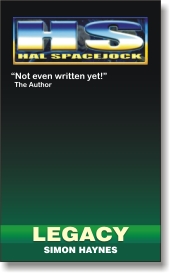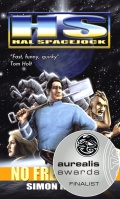David Louis Edelman's debut novel Infoquake was released by Pyr in 2006. Barnes & Noble Explorations called the story of cut-throat software entrepreneurs in the far future "the love child of Donald Trump and Vernor Vinge" and later named it their SF Book of the Year. The book was also nominated for the John W. Campbell Award for Best Novel, and Edelman was nominated for the John W. Campbell Award for Best New Writer on the strength of that novel. Infoquake has just been re-released in mass market paperback by Solaris Books with a fancy new cover by Stephan Martiniere.
This week, Pyr is releasing book 2 of David's Jump 225 trilogy, MultiReal. The book continues where Infoquake left off, and has already been called "a thoroughly-successful hybrid of Neuromancer and Wall Street" by Hugo nominee Peter Watts.
BIO: In addition to writing novels, Dave has also programmed websites for the U.S. Army, the FBI, ExxonMobil, and Rolls-Royce; taught software to the U.S. Congress and the World Bank; written articles for the Washington Post and Baltimore Sun; and directed the marketing departments of biometric and e-commerce companies. Dave is well-versed in PHP, Ruby on Rails, WordPress, ColdFusion, HTML, Javascript, XML, and CSS, and is an expert in web usability, web design, search engine optimization, and writing for the web.
1) What was your inspiration for writing Infoquake and MultiReal?
Infoquake and MultiReal are two parts of a story I started writing in late 2000 about my dot-com experiences in the '90s. I'm a marketing guy and web programmer by trade, and I saw a number of crazy things during the dot-com bubble. Mostly I was interested in the personal dynamics -- how charismatic schemers like my protagonist Natch convinced so many people to invest in so many worthless companies.
So in 2000 and 2001, I wrote a novel titled Jump 225.7, which you might call a far-future satire of the dot-com era. I literally finished the first draft of it on September 10, 2001. Then suddenly the next day, satire seemed the wrong way to approach the story I was trying to tell. So when I started rewriting it, the story became much darker and more serious in tone. I tried to ask all the big questions about capitalism, about Western society, about human nature and greed and what the long-term prospects of the species were. The end result was the Jump 225 trilogy, starting with Infoquake and continuing with MultiReal.
2) Who are your favorite authors and books now and when you were growing up?
Growing up, my favorite author had to be J.R.R. Tolkien (unless Stan Lee counts). I'm sure I read the whole Lord of the Rings saga (including The Hobbit and The Silmarillion) half a dozen times. Then in adolescence I fell in love with Kurt Vonnegut, with a special reverence for Cat's Cradle and Slaughterhouse-Five. College brought John Barth to my attention, and I've been running the biggest fan website for his books since about 1996 or so. If I had to name my favorite author since college, I'd have to pick either William Gibson or Thomas Pynchon.
3) What is it about fantasy/science fiction that attracts you?
I think for me it's the ability to rethink absolutely everything about the world, down to the smallest nanoparticle. I'm a worldbuilding addict, so I like being able to examine and reconfigure the politics, the history, and the sociology of my world to suit the story I'm trying to tell. For the Jump 225 trilogy, I considered all of those things and more -- I even got down to the level of thinking up new building materials and trying to invent ways that people would move goods from place to place in the absence of trucks and an interstate system. I can't really think of any other genre you can do that in.
4) Why did you decide to make Natch a software entrepreneur?
When I started writing the Jump 225 trilogy, I followed the axiom of writing what you know. I'd worked for several high-tech start-ups run by young, charismatic, slightly unhinged software entrepreneurs. And so that's who I started with.
The supporting characters are also based on character types I'd met in dot-coms. Horvil is the heavy-set, brilliant engineering guy who prefers to run things behind the scenes and leave the politics to the boss. And Jara is the serious, no-nonsense marketing woman who has something of a love/hate relationship with the company.
5) What (besides writing) do you do for fun?
I'm incredibly boring. I read. I putter around on the computer and tinker with my websites. I watch a lot of movies, and I keep up with the news. I'm looking forward to having children so I can have the excuse that I'm "spending quality time with my family."
6) What sort of research did you do to write these books?
Infoquake is heavily concerned with biologic software (or "wetware," as it's sometimes called). I know something about software, but I know very little about biology or physiology. So I certainly had to do some basic research into how the human body works. The main technology behind MultiReal also involves quantum physics, so I had to beef up on that a bit too. I admit that I don't tend to delve very deeply into the subjects that I research; mostly it's just your basic Wikipedia and Google searches, combined with long involved discussions with subject matter experts I know.
7) Natch is a compulsive workaholic. Are you that way too?
Absolutely not. I'm actually not very much at all like Natch or Jara, the two main protagonists of the novels. Although I suppose I do share certain characteristics with them. If I had to name a character who was closest to me in temperament, I'd have to say Horvil, the fat cheerful engineer who's always putting up with Natch's crap.
8) The political factions in the Jump 225 trilogy are divided between governmentalists and libertarians. If you were a character in the books, which would you be?
A lot of people who've read Infoquake assumed that my sympathies lie with the libertarians, because that's where Natch's sympathy lies. But I'm definitely more conflicted in my politics. I like to pick and choose among the different parties and philosophies. I have some definite liberal tendencies but a number of conservative ones as well.
You'll discover in MultiReal that the political situation is much more nuanced than Natch makes it out to be in Infoquake. The central government, which really seems like the epitome of evil in Infoquake, is a conflicted organization itself with some do-gooders working in the fringes. And the libertarians are full of self-interested schemers who'll stab you in the back.
9) What are you writing now?
I'm currently about 80,000 words into Geosynchron, the third and final book of the Jump 225 trilogy. I'm a very slow writer and I write a million drafts, but I'm hoping to finish the whole thing by the end of the year.
10) Did you always want to write? Or did you stumble into it? How did you get where you are now?
Yes, I always wanted to write, ever since I was a little kid. I wrote my first "novel" when I was about 6 years old, and I spent much of my childhood building up a pantheon of superheroes with my brother. I studied creative writing in college at Johns Hopkins, and tried to write a novel in my early 20s. It wasn't until I had given up on the writing and spent half a dozen years in the trenches of high tech that I came up with an idea that I could follow through on. And that was the Jump 225 trilogy.
11) What does a typical writing day look like for you? How long do you write, that sort of thing?
I've never been very good about setting a concrete writing schedule. Maybe that's why it takes me so long to finish anything. I typically work about three days a week at my part-time web programming job, and then write whenever I have the free time and the inclination.
12) Where do you write?
I'm somewhat embarrassed to admit that I'm one of the guys you see sitting there at Starbuck's with his laptop for hours on end. For some reason, I find it easy to write with background chatter. But when I'm not writing there, I'm sitting on my couch at home with one dog on the back of the couch behind my head and one dog nestled between me and the armrest.
13) What is easiest/hardest for you as a writer?
The hardest thing for me as a writer is discipline. I have an easy time coming up with great ideas, and I find it very easy to sit down and start pecking on those first few paragraphs. But then I quickly burn out. If you're ever going to finish anything, you need to be able to batter your way through those burnout times, and I have a difficult time with that. And then I'm so rarely satisfied with what I write, it always takes me to forever to finish.
More about David Louis Edelman: http://www.davidlouisedelman.com
More about Infoquake: http://www.infoquake.net
More about MultiReal: http://www.multireal.net
Simon Haynes is the author of the Hal Spacejock and Hal Junior series (Amazon / Smashwords / other formats)

